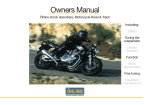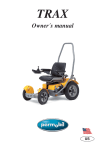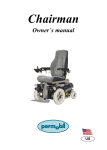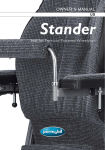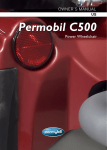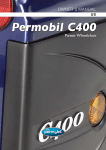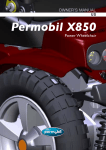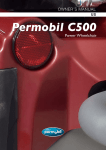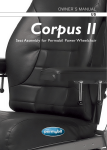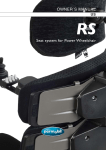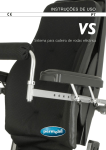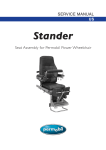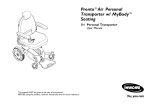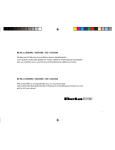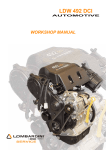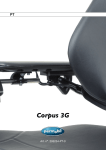Download Power Wheelchair OWNER´S MANUAL
Transcript
OWNER´S MANUAL US Koala Power Wheelchair How to contact Permobil Permobil Inc. USA 6961 Eastgate Blvd. Lebanon, TN 37090 USA Phone: 800-736-0925 Fax: 800-231-3256 Email: [email protected] Head Office of the Permobil group Permobil AB Box 120 861 23 Timrå Sweden Tel: +46 60 59 59 00 Fax: +46 60 57 52 50 E-mail: [email protected] Koala Power Wheelchair Produced and published by Permobil AB, Sweden Version no.: 5 - 2009-03 Art. no.: 201182-US-0 Owner´s manual Koala Contents Contents Important information about the owner´s manual . . . . . . . . . 6 General information . . . . . . . . . . . . . . . . . . . . . . . . . . . . . . . . . Technical support . . . . . . . . . . . . . . . . . . . . . . . . . . . . . . . . . . Spare parts & accessories . . . . . . . . . . . . . . . . . . . . . . . . . . . Disposal . . . . . . . . . . . . . . . . . . . . . . . . . . . . . . . . . . . . . . . . . Warranty & service . . . . . . . . . . . . . . . . . . . . . . . . . . . . . . . . . Product approval. . . . . . . . . . . . . . . . . . . . . . . . . . . . . . . . . . . 7 7 7 7 7 7 Safety rules . . . . . . . . . . . . . . . . . . . . . . . . . . . . . . . . . . . . . . . . 8-23 Design and function . . . . . . . . . . . . . . . . . . . . . . . . . . . . . . . . . General . . . . . . . . . . . . . . . . . . . . . . . . . . . . . . . . . . . . . . . . . . . . Chassis . . . . . . . . . . . . . . . . . . . . . . . . . . . . . . . . . . . . . . . . . Seat . . . . . . . . . . . . . . . . . . . . . . . . . . . . . . . . . . . . . . . . . . . . Seat lift . . . . . . . . . . . . . . . . . . . . . . . . . . . . . . . . . . . . . . . . . Wheels . . . . . . . . . . . . . . . . . . . . . . . . . . . . . . . . . . . . . . . . . Reflectors . . . . . . . . . . . . . . . . . . . . . . . . . . . . . . . . . . . . . . . Electrical system . . . . . . . . . . . . . . . . . . . . . . . . . . . . . . . . . . Control panel . . . . . . . . . . . . . . . . . . . . . . . . . . . . . . . . . . . . . 24 24 24 25 25 26 26 27 29 Accessories . . . . . . . . . . . . . . . . . . . . . . . . . . . . . . . . . . . . . . . . 37 Tool bag. . . . . . . . . . . . . . . . . . . . . . . . . . . . . . . . . . . . . . . . . 37 Handling . . . . . . . . . . . . . . . . . . . . . . . . . . . . . . . . . . . . . . . . . . . General . . . . . . . . . . . . . . . . . . . . . . . . . . . . . . . . . . . . . . . . . Driving . . . . . . . . . . . . . . . . . . . . . . . . . . . . . . . . . . . . . . . . . . Releasing the brakes . . . . . . . . . . . . . . . . . . . . . . . . . . . . . . Driving rules . . . . . . . . . . . . . . . . . . . . . . . . . . . . . . . . . . . . . Charging the batteries. . . . . . . . . . . . . . . . . . . . . . . . . . . . . . 38 38 38 41 42 44 Transport . . . . . . . . . . . . . . . . . . . . . . . . . . . . . . . . . . . . . . . . . . 46 Transporting by air . . . . . . . . . . . . . . . . . . . . . . . . . . . . . . . . 47 Maintenance and repairs . . . . . . . . . . . . . . . . . . . . . . . . . . . . . 48 Repairs . . . . . . . . . . . . . . . . . . . . . . . . . . . . . . . . . . . . . . . . . . . . 50 Technical specifications . . . . . . . . . . . . . . . . . . . . . . . . . . . . . . 54 Important information (only for the US market) . . . . . . . . . . . . . . . . 55 Owner´s manual Koala Important information about the Owner´s Manual Important Information about this Owner’s Manual We congratulate you on your choice of power wheelchair. Our goal is for you to continue to feel satisfied with your choice of both vendor and wheelchair. Before you begin using your wheelchair, it is important that you read and understand the content of these operating instructions and in particular the Safety Instructions. These operating instructions are primarily intended to acquaint you with the functions and characteristics of the wheelchair and how you can use them in the best manner possible. They also contain important safety and maintenance information, as well as describing possible problems that can arise while driving the wheelchair. Always keep these operating instructions handy in connection with your wheelchair, since the need for important information can arise concerning its use, safety and maintenance. It is also possible to obtain information concerning our products from our home page on the Internet. You can find us at www.permobil.com. All information, pictures, illustrations and specifications are based upon the product information that was available at the time that these operating instructions were printed. Pictures and illustrations that are found in these operating instructions are representative examples and not intended to be exact depictions of the various parts of the wheelchair. We reserve the right to make changes to the product without prior notice. Ordering of Documentation If you are in need of another copy of the Owner’s Manual, it can be ordered from Permobil, ask for item No. 201182-US-0. -6- Owner´s manual Koala Technical support, warranty, etc. TECHNICAL SUPPORT In the event of technical problems, you should contact your dealer or Permobil Inc USA at 1-800-736-0925. Always state the chassis serial number when contacting Permobil to ensure that the correct information is provided. SPARE PARTS & ACCESSORIES Spare parts and accessories must be ordered through your dealer. SCRAPPING THE WHEELCHAIR Contact Permobil Inc. for information about scrapping agreements in force. WARRANTY A warranty registration card is attached to each new wheelchair. The Permobil Inc. Product Warranty Information sets forth the conditions of the warranty. Contact your dealer or Permobil Inc USA for information about the warranty period for this wheelchair. -7- Owner´s manual Koala Safety instructions Safety Instructions - General A power wheelchair is a motorized vehicle and special care must therefore be taken when it is used. Please read and follow all instructions and warnings in this manual before operating your Permobil powered wheelchair. Incorrect use may both injure the user and damage the chair. In order to reduce these risks, you should read the Owner’s Manual carefully, in particular the safety instructions and their warning texts. Throughout this manual the following symbol will be used to note items that have significant importance to safety concerns: NOTE Please use caution where this symbol appears. WARNING Please use extreme caution where this warning symbol appears. Failure to observe warnings can lead to personal injury and property damage, including damage to the wheelchair. Permobil is not responsible for personal injuries or property damage resulting from any person’s failure to follow the warnings and instructions in this manual. Permobil is not responsible for injuries or damage resulting from failure to exercise good judgment. The final selection and purchasing decision about the type of power wheelchair to be used is the responsibility of the wheelchair user and his or her healthcare professional. Permobil Inc. is not responsible for inappropriate selections of wheelchair models or features or improper fitting of the wheelchair. -8- Owner´s manual Koala Safety instructions Safety Instructions - General Your wheelchair was configured specifically for your needs as prescribed by your healthcare provider. Consult your healthcare provider before changing the seat position or making any other adjustment. Some adjustments may reduce your wheelchair’s performance or safety or may not be appropriate for your needs. It is also of the utmost importance that you devote sufficient time to become acquainted with the different buttons, the function and steering controls, the different adjustment possibilities of the seat, etc. of your wheelchair and its accessories before you begin using it. Do not undertake your own first test drive without making sure that you have assistance in the immediate vicinity if you should need help. In order to make sure that nothing happened to the wheelchair while it was being shipped to you, you should check the following items before beginning to use it: • that all products ordered are included in the delivery, incuding operating instructions and possible other documentation. If you suspect that something is missing, then contact your supplier or Permobil for more information as soon as possible. • that no transport-related or other damages have occurred to the wheelchair and its accessories. If you discover that something has been damaged or in some other manner appears to be incorrect, then contact your supplier or Permobil for more information as soon as possible before you continue the checks. We recommend that you charge your wheelchair's batteries before you begin using it. The chapter titled ”Charging the Batteries” describes how to do this. Always be sure that tires are inflated properly before driving. If you experience that the wheelchair in any manner is not behaving as expected or if you suspect that something is wrong: abort the test drive as soon as possible, shut off the wheelchair and get in touch with your service contact or Permobil for more information. -9- Owner´s manual Koala Safety instructions Safety Instructions WARNING Operation Permobil recommends the use of wheelchair lights at all times user is riding near public rights of way. Use extreme caution when driving near unprotected ledges, drop-offs or on elevated surfaces. Unintended movement or excessive speed in these areas can lead to personal injury or property damage. Do not drive the wheelchair over any curbs or edges higher than 3 inches. When driving over a curb or similarly elevated surface, you must cross the surface at a 90 degree angle (perpendicular). Crossing such surfaces at any other angle may result in the wheelchair tipping. Reduce your speed when driving on uneven terrain or soft surfaces. Do not use your wheelchair on stairs or escalators. Always use an elevator. Do not lift or move the wheelchair by any of its removable parts. Doing so could lead to personal injury and property damage, including damage to the wheelchair. NOTE Operation Do not let children drive the wheelchair without supervision. Do not drive the wheelchair on public streets or roadways. Obey all local pedestrian rules and be aware that vehicle drivers may have difficulty seeing you. Do not operate your wheelchair under the influence of alcohol. Consumption of alcohol may impair your ability to operate your wheelchair safely. Some physical limitations or use of medication, either prescribed or over-thecounter, may limit your ability to operate your wheelchair safely. Be sure to consult with your physician about your physical limitations and medications. -10- Owner´s manual Koala Safety instructions Safety Instructions WARNING Modifications Any unauthorized modifications to the wheelchair or its various systems may increase the risk of personal injury and property damage, including damage to the wheelchair. All modifications to and interventions in the vital systems of the wheelchair must be performed by a qualified service technician authorized by Permobil to perform such service on Permobil products. Weight Limitations The maximum user weight for your Permobil is set forth in the specification section of the supplied Owner´s Manual for current seat model. Operation of the wheelchair by users who exceed the maximum allowable user weight can lead to personal injury and property damage, including damage to the wheelchair, as well as voiding any applicable warranty to the wheelchair. Do not carry passengers on the wheelchair. Doing so can lead to personal injury and property damage, including damage to the wheelchair. NOTE Prior to Riding In some instances, including where certain medical conditions exist, users should practice operating their wheelchair under the supervision of an assistant who is familiar with the operation of the wheelchair and with the abilities and limitations of the user. -11- Owner´s manual Koala Safety instructions Safety Instructions NOTE Operation - Inclines When driving downhill, select the slowest speed and proceed with caution. Driving down an incline in a front wheel drive wheelchair can shift the user’s center of gravity forward. If the wheelchair rolls faster than you would like, stop the wheelchair by releasing the joystick and begin descending again at a slower speed. Avoid sudden stops or starts. Stop by releasing joystick rather than by turning the power off. Turning off power while the wheelchair is in motion will cause the wheelchair to stop suddenly. Be sure to keep all recommended positioning belts securely fastened at all times. When driving up an incline, try to keep moving at a steady speed. Stopping and starting the chair while moving up an incline makes the wheelchair more difficult to control. Do not drive up or down slopes with a gradient greater than indicated in the technical specifications section of the manual. There is a risk that the wheelchair will not maneuver safely. -12- Owner´s manual Koala Safety instructions Safety Instructions WARNING Operation - Inclines Do not drive the wheelchair where the sideways gradient is more than indicated in the technical specifications section of the manual. There is a risk of tipping over. Do not drive up or down ramps that are not equipped with proper edge protection along the sides of the ramp to prevent the wheelchair from falling off of the ramp. When driving up an incline, be sure to drive your wheelchair straight up the incline (perpendicular). Driving at an angle up an incline increases the risk of tipping or falling. Use extreme caution when driving up an incline. Do not drive down or up a hazardous incline, such as a surface covered with snow, ice, or wet leaves or a surface that is uneven. Also avoid driving on ramps that do not have proper edge protection. -13- Owner´s manual Koala Safety instructions Safety Instructions WARNING Operation - Turning Turning your wheelchair at high speeds can create the possibility of the wheelchair tipping and personal injury. The possibility of tipping can be increased by high turning speed, sharp turns, uneven surfaces, abrupt changes in direction, and driving from an area of low traction (e.g. lawn) to an area of high traction (e.g. sidewalk). To protect against tipping, personal injury and property damage, reduce speed and reduce the sharpness of your turn when turning. Operation - Freewheel Mode In order to prevent the wheelchair from rolling away, ensure that the wheelchair is on a level and dry surface before releasing the brakes. In order to avoid personal injury do not use your Permobil in freewheel mode without an attendant present. Do not attempt to put the wheelchair in freewheel mode by yourself while seated in it. Do not put the wheelchair in freewheel mode while on an incline. This could cause the wheelchair to roll on its own, causing injury and property damage, including damage to the wheelchair. -14- Owner´s manual Koala Safety instructions Safety Instructions NOTE Driving on a Loose or Soft Surface When the wheelchair is set to its lowest speed and the batteries are not fully charged, driving on certain surfaces, for example gravel, sand or thick carpeting, can involve constrained navigability. Driving in Darkness Driving in the dark may only be done if your wheelchair is equipped with functioning lighting in the front and the back, or as per the applicable national or local traffic regulations. Driving in Extreme Climate Conditions Permobil's wheelchairs are designed to withstand most adverse weather conditions, however to minimize the risk of being caught in difficult situations you should avoid using the wheelchair outdoors during, for example, severe cold, heavy rain or thick snow. Also bear in mind that certain surfaces on the wheelchair can be heated up or cooled down in the event of prolonged exposure to intense sunlight or cold respectively. -15- Owner´s manual Koala Safety instructions Safety Instructions WARNING Driving with Seat Lift/Seat Tilt/Backrest Recline Be careful in making sure that nothing gets stuck between the chassis and the seat when the seat lift/seat tilt is operated. Operating the seat lift,seat tilt/ backrest recline changes the center of gravity and increases the risk of tipping over. Always drive in low speed and only use those seat functions on level ground, and not on hills, ramps, slopes or other inclines. Using those seat functions while driving on inclines can lead to personal injury and property damage, including damage to the wheelchair. Center of Balance The possibility of this wheelchair tipping and the point where this wheelchair will tip forward, back or to the side depends on its center of balance. Please note that the following factors can affect the wheelchair’s center of balance: • • • • • Elevation of the seat Height and angle of the seat/backrest Body position or weight distribution Driving on an incline such as a ramp or a hill Use of a backpack or other accessories, depending on the amount of weight added. If your wheelchair begins to move in an unexpected manner, immediately release the joystick to stop the wheelchair. Except in an emergency, do NOT use the on/off button to stop your wheelchair. This will cause the wheelchair to stop abruptly and may cause personal injury. Fixed Seat Post Adjusting the seat height may only be performed by an authorized service provider. See the Service Manual for more information. -16- Owner´s manual Koala Safety instructions Safety Instructions WARNING Positioning Belt Permobil positioning belts are designed to position the user only and will not protect you in an accident. You may even receive further injury from the belts. Support Wheels If your wheelchair is equipped with support wheels, they must always be mounted when the wheelchair is being driven. Transfer into and out of the chair Be sure that the power is turned OFF before entering or leaving the wheelchair and before lifting the control side armrest. When transferring into or out of the wheelchair, every precaution should be taken to reduce the distance between the wheelchair and the place to which the user is transferring. Overextending this distance can cause user to overexert, lose balance, or fall. Permobil recommends that users transfer in the presence of or with the assistance of an attendant. Use caution when bending or reaching. Never use the joystick as a handhold or point of support. Do not use foot plates or armrests as supports when transferring into or out of the wheelchair. The footplates and armrests are not designed to be weightbearing structures. Excessive force may cause them to give way, resulting in personal injury or property damage, including damage to the wheelchair. -17- Owner´s manual Koala Safety instructions Safety Instructions WARNING Passengers The wheelchair is not intended to transport passengers, regardless of the age of the passenger. The Maximum User Weight stated in the Owner's Manual for your seating includes the user and any personal effects. The Maximum limit should not be exceeded. The wheelchair's maneuverability and stability can be degraded as a result. Environmental Conditions Protect your wheelchair from exposure to any type of moisture, including rain, snow, or wash. Exposure to moisture can caused the chair to short-circuit, catch fire and cause personal injury or property damage. Do not operate your wheelchair if it has been exposed to moisture until it has dried completely. If any of the shrouds or the joystick boot has cracks or tears, they must be replaced immediately. Failure to do so can allow moisture to enter the electronics and cause personal injury or property damage, including fire. Do not operate your wheelchair in icy or slippery conditions. These conditions can lower the performance and safety of your wheelchair which could lead to an accident, personal injury and property damage, including damage to the wheelchair. NOTE: Extreme care should be exercised when using oxygen in close proximity to electric circuits and other combustible materials. Contact your oxygen supplier for instruction in use of oxygen. -18- Owner´s manual Koala Safety instructions Safety Instructions WARNING Transport The wheelchair must be transported in or with transport solutions that have been approved for this purpose. Check that the wheelchair is properly secured and that the wheel locks are not disengaged. The wheelchair can be locked into position by running fastening straps through the brackets at the front and back. Also check that the fastening points on the transport vehicle are well-anchored. A defectively fastened chair can cause serious injury to persons in the vehicle and serious damage to the vehicle. Use Prohibited in Motor Vehicles Permobil recommends that users NOT be transported in any kind of vehicle while in their wheelchair, unless the user is in an approved Permobil wheelchair configuration, has secured the wheelchair using a Permolock C, and is using a seatbelt attached to the vehicle. The only other safe alternative is that users be transferred into factory vehicle seating for transportation and use safety restraints made available by the auto industry. The only wheelchair transportation system Permobil recommends is a Permolock C used in combination with an approved Permobil wheelchair. Unless using a Permolock C with an approved Permobil wheelchair, never sit in your wheelchair while in a moving vehicle. In an accident or sudden stop, you may be thrown from the chair and seriously injured or killed. Permobil positioning belts are designed to position the user only and will not protect you in your vehicle if you are in an accident. -19- Owner´s manual Koala Safety instructions Safety Instructions WARNING Maintenance and Service Carry out only the service and maintenance which are stated in the Owner’s Manual. All other service and maintenance must be performed by a qualified service technician authorized by Permobil to perform such service on Permobil products During all work on the electrical system of the wheelchair, the Circuit Breaker must always be in OFF position. To avoid the risk of electric shock, use extreme caution when using metal objects while working on the batteries. Short-circuiting can easily cause an explosion. Never perform service on the wheelchair without using protective gloves and goggles. Failure to do so can lead to personal injury. Do not use parts or accessories not authorized by Permobil. Use of unapproved ”aftermarket” accessories and parts may cause changes in the wheelchair, which may make the wheelchair unstable or uncontrollable. Such use may also void the warranty on the wheelchair. Connecting any unapproved electrical or electronic devices to the wheelchair’s electrical system can cause damage to the chair and caused the chair to become uncontrollable or drive erratically. Such use may also void the warranty. The wheelchair is heavy and contains many moving parts, which means that the risk of being caught between them is always present. Charging of Batteries Charging must be done in a well-ventilated room, not in a wardrobe or closet. Charging must not be done in a bathroom or wet room. Only chargers with a max 10 A charging current (average value) may be used (the RMS value of the charging current must not exceed 12A). When the charger is connected, the chair must not and cannot be driven. -20- Owner´s manual Koala Safety instructions Safety Instructions WARNING Safety Circuits Permobil products are equipped with safety circuits. Inhibit circuits prevent the wheelchair from driving under certain conditions. Speed reduction circuits limit the wheelchair’s maximum speed under certain conditions. Limit switch circuits limit the wheelchair’s functions under certain circumstances. Overload protection circuits shut the wheelchair off in case of an overload. The user should stop using the wheelchair immediately and consult an authorized Permobil distributor if any of these circuits should become disabled. Any attempt to modify the safety circuits will result in unsafe operation of the wheelchair and could cause the chair to become unstable or uncontrollable. Such modifications may also void the wheelchair’s warranty. Changing Batteries and Fuses The Circuit Breaker must always be in OFF-position when batteries and fuses are replaced. Observe care in the use of metallic objects when working with batteries. A short-circuit can easily cause an explosion. Always use protective gloves and protective eye-glasses. Filling Air into tires Check at regular intervals that the wheelchair's tires have the prescribed tire pressure. Incorrect tire pressure can cause deteriorating stability and maneuverability. The prescribed tire pressure is 29 psi (200 kPa). Note that overfilling causes a risk of explosion. -21- Owner´s manual Koala Safety instructions Safety Instructions WARNING Changing Tires Avoid the use of sharp-edged tools when working with tires. If the wheel bolt is removed for tire service, replace it with a new, unused part from Permobil and tighten the bolt to the recommended torque. Also, inspect the drive axle and wheel rim for any damage. Damage to either part can cause the wheel bolt to loosen or fracture. Permobil recommends that wheel bolts be used only one time. Storage The wheelchair and its accessories must always be shut off when they are not being used. Always store the wheelchair so that access for unauthorized individuals is avoided. Never store the wheelchair in a room in which condensation can arise (mist or dampness on the surfaces) e.g. in pool areas, laundry rooms, or similar rooms. If you are unsure as to how your wheelchair and its accessories should be properly stored, contact your supplier or Permobil for more information. Damages/malfunctions on the wheelchair and its accessories If you experience that the wheelchair in any manner is not behaving as expected or if you suspect that something is wrong: Stop driving as soon as possible, shut off the wheelchair and contact your service contact or Permobil for more information. It’s also of greatest importance that Permobil be informed if the wheelchair and its accessories have been subjected to transport damages, damages during driving or damages due to another cause as soon as possible after the event. There exists a risk that the wheelchair and its accessories can no longer be used in a safe and secure manner. -22- Owner´s manual Koala Safety instructions Safety Instructions NOTE Recycling of Batteries Used or broken drive batteries should be taken care of in an environmentally correct manner in accordance with locally applicable recycling directions. EMC Requirements The electronics of an electrical wheelchair can be affected by external electromagnetic fields (for example from mobile telephones). Similarly, the electronics of the wheelchair itself can also emit electromagnetic fields that can affect the immediate surroundings (for example certain alarm systems in businesses). The limit values for Electromagnetic Compatibility (EMC) with respect to electrical wheelchairs is set in the harmonized standards for the EU in the Medical Devices Directive, No. 93/42/EEC. Permobil's electronic wheelchair’s comply with these limit values. Also see Important Information about Electromagnetic Interference (EMI) on page 56-57. -23- Owner´s manual Koala Design and Function Design and Function General 1 5 5 2 3 4 6 7 1. Seat 5. Control panel 2. Chassis 6. Battery cover 3. Rear wheel 7. Chassis cover 4. Drive wheel Fig.1. Koala. -24- Owner´s manual Koala Design and Function Seat See enclosed seat instructions. Seat lift/seat adjustment Koala is fitted with an electrically controlled seat lift. A position adjuster operated from the control panel allows continuous adjustment of the seat to any height between 15-24 inches, permitting simple matching with table, seat heights etc. Whenever the seat lift is raised from its lowest position the chair's maximum speed is lowered to 2 mph. If the seat angle catch (Fig. 2) is released, the chair will tilt back when the seat lift reaches its highest position. Pull out the knob and twist to release the catch. The chair will not tilt while the catch is engaged. Fig. 2. Seat angle catch when pulled out. The chair is fitted with two safety switches which cut off current to the seat lift if anything is trapped between the chassis and the seat. The safety switches are located on the battery cover. Make sure nothing is trapped between the chassis and the seat when operating the seat lift. Because the center of gravity is higher when the seat is raised, and there is an increased the risk of tipping, use the seat lift only on level surfaces. -25- Owner´s manual Koala Design and Function 1 2 1. Position adjuster 2. Safety switch Fig. 3 Seat lift. Wheels The front wheels of the wheelchair, the drive wheels, have pneumatic tires. The swivel-mounted rear wheels have solid rubber tires. Reflectors The standard wheelchair has no lighting but is fitted with reflectors. When traveling at night, lighting should be fitted. Available as an optional purchase. Fig. 4 Reflectors. -26- Owner´s manual Koala Design and Function Electrical system The wheelchair batteries are situated under the battery cover in the center of the chassis. The batteries are maintenance-free (gel-type), so there is no need to check fluid levels. Fig. 5. Batteries. Drive system The wheelchair has a drive pack for each drive wheel. The motors regulate speed, turning and braking. A joystick on the control panel passes signals to the electronic unit under the chassis cover on the right-hand side, which in turn controls the motors. Driving gear Electric motor Fig 6. Electric motor with driving gear. -27- Owner´s manual Koala Design and Function Main circuit-breaker You can reset the main circuit-breaker if it trips. It is on the underside of the chassis, over the right, rear wheel, see fig. 7. The main circuit-breaker is protected from dirt and water by a rubber flap, which you can easily fold back. NB! If the circuit breaker trips, it usually means that there is a serious electrical fault. Before you reset the main fuse, check carefully or, call a qualified service technician. Charging fuse The charging fuse is next to the main circuit-breaker, on the underside of the chassis, over the right, rear wheel, see fig. 7. Charging fuse Main circuitbreaker Fig.7. Main circuit-breaker and charging fuse -28- Owner´s manual Koala Design and Function Control panel The control panel of the wheelchair is mounted on the right arm rest and its location can be adjusted to achieve the most comfortable position in connection with maneuvering. The control panel can also be mounted on the left arm rest. The fig. below shows the various functions of the control panel. You can also have a seat control panel fitted to your wheelchair. You can then choose whether you want to adjust the electrical seat functions from the seat control panel. 4 5 6 9 7 8 A 10 B 3 2 1 C Fig. 8. Control panel Koala 1. Selector 6. Lights 2. Indicators 7. Indicators 3. Warning light 8. Horn 4. Switch, on/off 5. Battery voltage indicator Fig. 9. Adjusting the control panel. A. Sideways adjustment Loosen the screws and adjust the control panel to the desired position. 9. Joystick B. Friction joint Turn to adjust how light or stiff you want the sideways movement of the panel to be. 10. Seat control panel C. Length adjustment Loosen the screw and adjust the length as required. -29- Owner´s manual Koala Design and Function Security key The security key can be used to lock the wheelchair to prevent unauthorized use. To lock the wheelchair it must be switched on, the key should then be inserted into and withdrawn from the panel outlet, the wheelchair will now be locked. To unlock the wheelchair, switch it on. The maximum speed indicator will ripple up and down but driving will not be possible. The key should now be inserted into and withdrawn from the panel outlet. The wheelchair can now be driven. Fig.10. Panel outlet with security key Switch, on / off You use this button to turn power on and off. The start button must have been pressed for the chair to operate. Fig.11. Start button MODE (selector) You use this switch to activate the speed selector and »Leverman« (see page 33). Fig.12. Mode (selector) -30- Owner´s manual Koala Design and Function Battery voltage indicator The window display on the control panel (fig.13) shows the following indicator lights (from bottom to top) : Red+Yellow+Green = Fully charged Red+Yellow = Half charged Red = Charge the batteries Fig.13. Battery voltage indicator Warning symbol When you press the switch, the indicator lamps flash on the control panel for the warning symbol (red lamp) and for both indicator lights (green lamp). If your wheelchair has lights, both indicator lamps flash too, to attract attention. NB! This function works even when the start button is switched off. Fig. 14. Warning signal. Speed selector The speed can be set in 5 stages, and one or more of the indicator lamps light depending on which speed range has been selected. 1 - 2 lamps 3 - 4 lamps 5 lamps = Low speed = Medium speed = Maximum speed Fig. 15. Speed selector -31- Owner´s manual Koala Design and Function Lights Press the switch to turn on the lights of the wheelchair. Lights Indicators Indicators Pressing the right or left arrow activates the chair’s indicators. Fig.16. Light/indicator switches Warning horn Press the button to sound the horn and attract attention. Joystick The joystick is used to regulate the speed of the wheelchair forwards or backwards, to turn and to brake. The speed is regulated proportionally by moving the joystick forwards or backwards. The speed is directly proportional to the movement of the joystick (small movemen = low speed - large movement = high speed). The wheelchair is turned by moving the joystick to the left or right. The wheelchair is braked by moving the joystick back to the neutral position or letting it go. -32- Fig.17. Horn switch Fig.18. Joystick Owner´s manual Koala Design and Function Leverman (Joystick manager) With the help of the Leverman, you can use the joystick to control the speed of the chair (5 positions), and the seat lift. Operating the Leverman 1. Switch the start button on the control panel to ”on”. 2. Press the MODE button. The battery indicator lights and the speed selector lights flash. Step the speed range up or down by moving the joystick right or left. 3. Press MODE to move through the program. The right foot-plate lights. 4. Move the joystick to the right and the seat lamp will come on. Moving the joystick forwards or backwards will raise or lower the height of the seat. 7. Press the MODE button again. The program ends and the chair is ready to drive. -33- Fig.19. Seat lift Owner´s manual Koala Design and Function Seat control panel The seat control panel is attached to the right or left-hand armrest behind the control panel. The picture below show the function of the seat control panel. Seat lift, fig. 20:1 The seat is raised when the top part of the seat lift button is pressed, and lowered when the bottom part of the button is pressed. 1 2 3 4 Fig. 20. Seat control panel 1. Seat lift 2. No function 3. No function 4. No function -34- Owner´s manual Koala Design and Function Joystick The joystick is used to regulate the speed of the wheelchair forwards or backwards, to turn and to brake. Speed The speed is regulated proportionally by moving the joystick forwards or backwards. The speed is directly proportional to the movement of the joystick. • Small movement = low speed. • Large movement = high speed. Fig 21. Speed regulation -35- Owner´s manual Koala Design and Function Turning and braking The wheelchair is turned by moving the joystick to the left or right. The wheelchair is braked by moving the joystick back to the neutral position or letting it go. Fig 22. Turning speed -36- Owner´s manual Koala Accessories Accessories We are constantly developing accessories for our wheelchairs. Contact your nearest Permobil retailer for more information about the accessories available for your wheelchair. Tool bag The wheelchair is supplied with a tool bag which contains the following tools. 1 3 2 4 5 Fig 23. Tool bag Tool Area of use 1. 1 Screwdriver General maintenance/removal of covers 2. 1 Set of Allen keys General maintenance/adjustment of the seat 3. 2 13 mm spanner General maintenance, changing the battery 4. 1 Security key Lock/Unlock the wheelchair 5. 1 Pair of protective goggles Work on the batteries -37- Owner´s manual Koala Handling Handling General This wheelchair is designed for use both inside and outside. When driving inside, take normal care. Outside you must remember to drive very slowly on steep downhill slopes and not to drive over curbs and other obstacles higher than 2.5 inches. Do not make the first test run on your own. The test run is to find out how you and the wheelchair work together and you may need some assistance. Driving 1. Switch on the wheelchair by pressing the start button on the control panel. Fig. 24. Start button -38- Owner´s manual Koala Handling 2. Set a suitable speed range by first pressing the MODE button and then use the joystick to select the speed, until the desired indicator lamp comes on for your type of driving. Increase speed Reduce speed = Step to the right. = Step to the left. 1 - 2 lamps = Low speed 3 - 4 lamps = Medium speed 5 lamps = Maximum speed Fig. 25. Speed selector 3. Move the joystick carefully forwards to drive forwards, or backwards to reverse. Fig. 26. Driving forward/backwards -39- Owner´s manual Koala Handling 4. The speed of the wheelchair is regulated proportionally by moving the joy stick forwards or backwards to different extents. The wheelchair's electronics make it possible to move slowly over curbs and other obstacles. You can drive up to the curb or obstacle and then carefully drive over it. When you drive down an obstacle or a steep slope, you must drive slowly and brake gently. The maximum speed should be set to low speed. You can brake gently by pulling the joystick back to a position just before the neutral position. When the speed has been reduced, you can let the joystick go. NB! The wheelchair moves at reduced speed if the seat is raised. You can only drive at full speed if the seat is in its lowest position. Raising the seat lift raises the center of gravity and increases the risk of tipping. Therefore, you should only use the seat lift when driving on level ground and not on hilly ground. Steering The wheelchair can be turned in the required direction by moving the joystick to one side or the other while driving forwards or backwards Fig. 27. Steering -40- Owner´s manual Koala Handling Releasing the brakes In order to avoid the wheelchair rolling away, ensure that the wheelchair is on a level and dry base before releasing the brakes. The brakes can be released to make it possible to move the wheelchair manually. 1. Press the on/off switch to switch off the wheelchair. 2. Pull the level back and up, see Fig. 28. The chair can now be moved manually. NB! Reset the brakes after moving the chair by pulling the lever down. When the brake release has been activated, the wheelchair cannot be driven. Fig. 28. Releasing the brakes -41- Owner´s manual Koala Handling Driving rules High curbs and other obstacles Do not drive the wheelchair over curbs and other obstacles higher than 2.5 inches. Max 2.5 inches Fig. 29. High curbs and other obstacles Downhill slopes When driving downhill, select the slowest speed and proceed with caution. Do not drive down slopes with a gradient greater than 6 degrees*). Max 6°*) Fig. 30. Driving downhill *)Dynamic stability according to ISO 7176-2 -42- Owner´s manual Koala Handling Driving up hill If you drive up slopes steeper than 10O, there is a risk that the wheelchair cannot be maneuvered safely. Do not drive up slopes steeper than 10 degrees. Max 10° Fig. 31. Driving up hill Driving along slopes Do not drive the wheelchair along slopes steeper than 10 degrees. There is a risk of tipping. Max 10° Fig. 32. Driving along slopes -43- Owner´s manual Koala Handling Charging the batteries The batteries must be charged in a well-ventilated room, not in a closet. Do not charge the batteries in a bathroom or wet room. Take care when using metal objects in connection with work on the batteries. Short-circuiting can easily cause an explosion. Always use protective gloves and goggles. Use only chargers with a maximum 10 A charging current (mean value). (The effective value of the charging current must not exceed 12 A.) Fig. 33. Lester Electrical´s Dual mode charger -44- Owner´s manual Koala Handling When should the batteries be charged? As a general rule, you should recharge your batteries as frequently as possible to assure the longest possible life and to minimize the required charging time. Plan to recharge them when you do not anticipate using the chair for a long period of time. A battery voltage indicator on the control panel indicates when the battery voltage is low (see figure 13 on page 31). The batteries must then be charged as soon as possible. If the batteries should become completely discharged, it is important that you recharge them as soon as possible. If you delay before recharging them, the batteries can be damaged. Charging 1. Connect the charger to the 110 volt supply. 2. Connect the charger cable from the charger to the charging socket, Fig. 34, on the wheelchair. NB! When the charger is connected, the chair must not and cannot be driven. 3. Turn ”on” the charger. After charging, turn the charger ”off” before disconnecting cord from the chair. Description and Use of Battery Charger, see supplied Owner’s Manual. Fig. 34. Charging socket -45- Owner´s manual Koala Transport Transport We recommend that Permobil wheelchairs are transported tied down at all times. The Permobil can be locked in place with loading belts attached to the supplied tie-down points on the front panel and at the side by the bumper. If the chair has to be transported in a mini van or other vehicle it is vital that the chair is properly secured and that the tie-down points used are well anchored. A poorly tied down chair can cause serious injury to passengers if it comes loose, not to mention damage to the vehicle and the wheelchair itself. Side tie-down points Front tie-down points Fig. 35. Wheelchair tie-down points -46- Owner´s manual Koala Transport Air transport When transporting your chair by air, you should be aware of three things above all: the batteries, the dimensions and weight of the wheelchair and that the seat can be damaged when handled, as it is placed together with luggage and other goods in a narrow space. Batteries If the wheelchair is equipped with maintenance-free gel batteries: in some airlines it is not necessary to remove the batteries from the wheelchair during the flight. However, the electrical connections to the battery must be disconnected and insulated. Check with your airline which rules apply. If a wheelchair is equipped with acid batteries, most airlines require that the batteries shall be removed from the wheelchair and transported in special boxes provided by the airline. Some airlines refuse to take acid batteries aboard at all, so always check with the airline in question which rules apply. See page 52 for how to remove the batteries. The dimensions and weight of the wheelchair The weight and dimensions of the wheelchair are significant in relation to the type of airplanes in which the wheelchair is to be transported. The smaller the airplane, the smaller the wheelchair may be/the less it may weigh and vice versa. Always check with the airline in question which rules apply. Preventing damage Cover the maneuvering panel with soft, shock-absorbing material (foamed plastic or similar) and fold it in towards the back rest. Protect other protrudinobjects in similar fashion. Tape any loose cables to the seat or covers. NB! To ensure that the chair is transported safely and that no nasty surprises pop up at the last minute, always contact the airline with which you are travelling beforehand. -47- Owner´s manual Koala Maintenance Maintenance Before working on the wheelchair's electrical system the connection to the negative pole of the battery must always be removed. Be careful with any metal objects when working on the battery. A short circuit could easily cause an explosion. Always wear safety gloves and goggles. Make sure nothing is trapped between the chassis and the seat when operating the seat lift. General For optimum performance of your wheelchair it is important to take good care of it. All wheelchairs are subject to wear, partly due to moving parts and partly due to stresses. What you need to know is how your wheelchair works, how to drive and use it in the best way and how to take regular care of it. The purpose of preventive maintenance is to prevent problems arising. If you look after your wheelchair it will function well and the risk of faults will be reduced. -48- Owner´s manual Koala Maintenance Cleaning Clean the wheelchair often. After use outdoors it should be cleaned even more thoroughly. Use a damp cloth with a mild soap solution to wipe off dirt and dust. Once in a while remove the battery and chassis covers and clean them thoroughly, wiping their undersides with a damp cloth. NB! Do not hose down your wheelchair! The electronics may be damaged. Wheels Regularly check the wheels for the correct tyre pressure. Top up the air if necessary. See page 53. Check of brake release Check regularly, approx. once per month, the brake release function by engaging and disengaging the brake release a number of times. Batteries Storage Note that a battery will run down of its own accord and a run-down battery will be ruined if it freezes in cold weather. If the wheelchair is to be kept unused for a lengthy period, the batteries must always be recharged once a month to prevent damage. NB! The temperature in the place of storage must not fall below 41 degrees f. The Permobil Koala has maintenance-free gel-type batteries. This means there is no need to check fluid levels. Battery life depends entirely on regular charging. Fig. 36. Batteries -49- Owner´s manual Koala Repairs Repairs Resetting the main fuse/battery cut-out The main fuse also functions as a battery cut-out but is still referred to as the main fuse in the user instruction. NB! First switch off the power on the maneuvering panel before switching the power off at the circuit breaker. Main circuit breaker You don’t normally need to change the main fuse, as you can reset it when it trips. You reset it by switching it to the "ON" position. The main fuse is under the chassis, over the right, rear wheel, see fig. 37. NB! If the circuit breaker trips, it usually means that there is a serious electrical fault. Before you reset the main fuse, check carefully or, call a qualified service technician. Charging fuse The charging fuse is next to the main circuit-breaker, see fig. 37. NB! The wheelchair should be inoperative when you change the charging fuse. Charging fuse 15A Main circuitbreaker 63A Fig.47. Main circuit-breaker and charging fuse -50- Owner´s manual Koala Repairs Raising/lowering the seat manually 1. When you are raising the seat, remove the cushion and screw out the three screws that holds the seat, when lowering, go straight to point 2. 2. Remove the screw that holds the positioning-motor cylinder bar in the seat lift, see fig. 38. 3. Raise/lower the seat lift. When raising the seat, you can use the catch to hook it up, see fig 38. The seat is heavy, and you must handle it carefully to avoid injury. Fig. 38. Fixing screws and catch on cylinder rod -51- Owner´s manual Koala Repairs Changing batteries 1. Place the wheelchair on a level base.. 2. Raise the seat lift to its full height. 3. Switch off the main switch. 4. Loosen the battery cover and disengage the terminal protection connector. NB! Be careful when removing the battery cover. The cable connector under the cover can cause injury. 5. Loosen the battery connections. First the positive, then the negative pole. Fig. 39. Battery Connections 6. Remove the spacer plate 7. Lift out the batteries. 8. Set in two new batteries. NB! Take note of the position of the batteries. 9. Replace spacer plate 10. Connect the battery connections, first the negative, then the positive pole. 11. Replace the battery cover (not forgetting the terminal protection connector) and lower the seat lift. 12. Charge the batteries, see Charging pages 44-45. -52- Owner´s manual Koala Repairs Changing an inner tube 1. Set up the wheelchair on blocks and let out the air. 2. Lever the tire out of the rim. 3. Replace the defective inner tube. 4. Replace the tire on the rim and reinflate. Fig. 40. Tire air valve Filling with air Low air pressure in the tyre will cause abnormal wear and a shorter travelling range. So, check regularly that the pressure in the front tyres is up to 29 psi (0,2 MPa) 1. Unscrew the plastic cap on the drive wheel air valve. 2. Attach a compressed air nozzle to the air valve and adjust the tirepressure to the prescribed level. Recommended air pressure 29 psi (0,2 MPa). Over-inflation could cause an explosion. -53- Owner´s manual Koala Specification Data General Name ................................................... Koala Size and weight Length.................................................. 39" Width.................................................... 22" Seat height .......................................... 15"-24" Smallest transport size, lxwxh ............. 28" x 22" x 26" Weight incl. batteries............................. 203 lbs(incl.Miniflex-seat.) Maximum weight of user ..................... See user manual for accompanying seat. Wheels Tire size, front...................................... 2.50 x 8 Air pressure, front tires ........................ 29 psi (0.2 MPa) Tire size, back ..................................... 200 x 50 metric size Performance Range .................................................. 12 - 16 miles Max speed, forward ............................. 4 mph Max speed, backwards........................ approx. 2.5 mph Turning distance, 180 degrees ............ 36" Ability to negotiate obstacles............... 2.5" Hill climbing capability, uphill ............... 10 degrees Hill climbing capability, downhill .......... 6 degrees*) *)Dynamic stability according to ISO 7176-2 = 7°. -54- Owner´s manual Koala Important information Electrical system Electronics PM80 Pilot+ Control panel JSM-L 7key Pilot+ Batteries Recommended battery type ................ M40-12 SLD G Battery capacity ................................... 2 x 38Ah Charging time ...................................... 8 hours Fuses Charging fuse ...................................... 15A Main fuse ............................................. 63A -55- Owner´s manual Koala Important information CAUTION! It is very important that you read this information regarding the possible effects of electromagnetic interference on your powered wheelchair. Electromagnetic Interference (EMI) From Radio Wave Sources Powered wheelchairs and motorized scooters (in this text, both will be referred to as powered wheelchairs) may be susceptible to electromagnetic interference (EMI), which is interfering electromagnetic energy (EM) emitted from sources such as radio stations, TV stations, amateur radio (HAM) transmitters, twoway radios, and cellular phones. The interference (from radio wave sources) can cause the powered wheelchair to release its brakes, move by itself, or move in unintended directions. It can also permanently damage the powered wheelchair’s control system. The intensity of the interfering EM energy can be measured in volts per meter (V/m). Each powered wheelchair can resist EMI up to a certain intensity. This is called its ”immunity level”. The higher the immunity level, the greater the protection. At this time, requested immunity level as per EN 60601-1-2 is 3 V/m. The immunity level of this powered wheelchair model as shipped, with no further modification, is >20V/m in the range of 26 MHz to 950 MHz. There are a number of sources of relatively intense electromagnetic fields in the everyday environment. Some of these sources are obvious and easy to avoid. Others are not apparent and exposure is unavoidable. However, we believe that by following the warnings listed below, your risk to EMI will be minimized. The sources of radiated EMI can be broadly classified into three types: 1. Hand-held portable transceivers (transmitters-receivers) with the antenna mounted directly on the transmitting unit. Examples includes: citizens band (CB) radios, ”walkie talkie”, security, fire, and police transceivers, cellular telephones, and other personal communication devices. NOTE! Some cellular telephones and similar devices transmit signals while they are ON, even when not being used. 2. Medium-range mobile transceivers, such as those used in police cars, fire trucks, ambulances, and taxis. These usually have the antenna mounted on the outside of the wehicle. -56- Owner´s manual Koala Important information 3. Long-range transmitters and transceivers, such as commercial broadcast transmitter (radio and TV broadcast antenna tower) and amateur (HAM) radios. NOTE! Other types of hand-held devices, such as cordless phones, laptop computers, AM/FM radios, TV sets, CD players, and casette players, and small appliances, such as electric shavers and hair dryers, so far we know, are not likely to cause EMI problems to your powered wheelchair. Because EM energy rapidly becomes more intense as one moves closer to the transmitting antenna (source), the EM fields from hand-held radio wave sources (transceivers) are of special concern. It is possible to unintentionally bring high levels of EM energy very close to the powered wheelchair’s control system while using these devices. This can affect powered wheelchair movement and braking. Therefore, the warnings listed below are recommended to prevent possible interference with the control system of the powered wheelchair. WARNINGS Electromagnetic interference (EMI) from sources such as radio and TV stations, amateur radio (HAM) transmitters, two-way radios, and cellular phones can affect powered wheelchairs and motorized scooters. Following the warnings listed below should reduce the chance of unintended brake release or powered wheelchair movement which could result in serious injury. 1. Do not operate hand-held transceivers (transmittersreceivers), such as citizens band (CB) radios, or turn ON personal communications devices, such as cellular phones, while the powered wheelchair is turned ON. 2. Be aware of nearby transmitters, such as radio or TV stations, and try to avoid coming close to them. 3. If unintended movement or brake release occurs, turn the powered wheelchair OFF as soon as it is safe. 4. Be aware that adding accessories or components, or modifying the powered wheelchair, may make it more susceptible to EMI. (Note: There is no easy way to evaluate their effect on the overall immunity of the powered wheelchair). 5. Report all incidents of unintended movement or brake release to the powered wheelchair manufacturer, and note whether there is a radio wave source nearby. -57- US Koala Article no.: 201182-US-0



























































